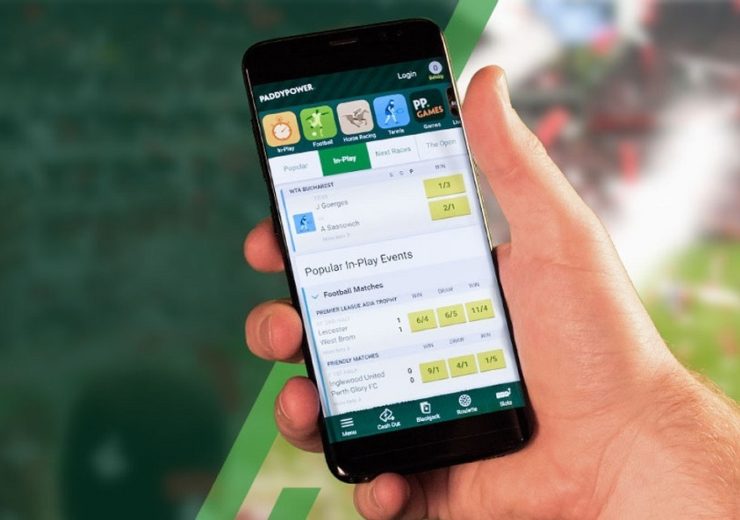5G's high bandwidth and low latency could enable fans in stadiums to make in-play bets that aren't always possible with 4G

Mobile apps are increasingly being used in sports betting (Credit: Paddy Power)
The global sports betting market will be worth $125bn by 2022, according to MarketWatch, but 5G could soon change the face of online gambling. Daniel Kornitzer, chief business development officer at payment company Paysafe, explains why.
Conversations around 5G data network opportunities are the height of the zeitgeist with companies making promises that the future is bright and seamless.
The sports betting industry is no different; increased bandwidth and reduced latency means that operators will be able to offer more powerful, compelling products to sports bettors, and in more locations.
With this in mind, it’s important for businesses in this industry to understand how players would want 5G to be harnessed to improve their betting experience, to ensure that tailored experiences are delivering return on investment.
5G represents an entire new ecosystem, from ultra-fast mobile network transmission speeds, to ever more powerful smartphones and access to edge computing.

One example of how we might see this play out could be fans watching a tennis game at a stadium with real-time access to a stadium edge device that collects first and second-serve speed, wind speed and direction, calculates stats, collects videos, and so on.
Momentum continues to build behind mobile
The growth of mobile sports betting continues to be the predominant trend impacting the rise of the sports betting industry.
We recently surveyed players and consumers in the US, Germany and the UK, and mobile apps remain the preferred sports betting channel for 37% of players across all markets, ahead of any other method including computer (31%) and in-person (26%).
The country breakdown highlights that mobile apps are the most popular channel for sports betting in both the UK and the US.
Betting on mobile devices is the preferred method for 43% of UK sports bettors and 34% of players in the US.
Following close behind, 32% of sports bettors in Germany prefer mobile, which is actually fewer than those who prefer betting on a computer or laptop (44%).
Some 53% of players globally said that the in-app user experience and being able to place bets anywhere (55% of players) are both important reasons they prefer mobile sports betting.
Will 5G have a significant impact on in-play online sports betting?
Of all current and potential sports bettors, one-in-five across countries (18%) envisage placing more in-play sports bets following the introduction of 5G.
With 42% of players across countries already placing more than one bet per week, sports bettors are excited for 5G’s entrance and say that they will increase the volume of in-play sports bets they make, and for half (21%) of these players this will include betting on new sporting events.

Players who are keen to increase the overall volume of mobile sports betting because of 5G have also expressed a desire to make more in-play bets.
Across countries, more than half (54%) of current and future players that foresee starting to bet or betting more frequently on mobile platforms following the introduction of 5G believe that they are likely to place more in-play bets.
More than a quarter (27%) want to bet on new sports or markets.
5G may also be the answer to players’ concerns with in-play betting
Players are currently most concerned with slow internet speeds or a lack of access to information.
With only 14% of current and potential future in-play sports bettors across all markets having no concerns when making these bets.
Some 22% of players across all markets are concerned that they cannot place their bets in time, and 19% are worried about the connectivity of their mobile device. And 18% of players think that they do not have enough information available to them to make informed bets.
Players expect to be able to bet more on mobile at major sports events via 5G networks, and this will make their experience more enjoyable. 5G provides the hope that these issues might be solved by increased bandwidth and zero latency.
Connectivity issues are having a severe impact on players’ current desire to place bets while attending sports events.
It’s why 31% of all sports bettors do not place bets while attending events, citing concerns about 4G-powered connectivity – and this figure rises to 51% for sports bettors that place more than one bet per week on average.
Some 52% of these regular sports bettors say that being able to place bets while attending sports events would make the experience more enjoyable for them, and 45% say that they are more likely to attend a sports event if they could place a wager when at the game.
When it comes to huge sporting events, 41% of sports bettors think it will become commonplace for fans to be able to mobile sports bet seamlessly as they are in attendance. For a quarter of players (26%) it is important that stadiums adapt to being 5G-capable to facilitate in-play sports betting.
US and Germany lead the way in alternative payments
Card payments are by far the most popular deposit method for online sports betting accounts.
The UK has the highest rate, with 69% of players saying card payments are their first choice for depositing, and this rises to 73% of players that bet more than once per week.
The percentage of players that say card payments is their first choice in Germany (30%) and the US (31%) is much lower.
Direct bank transfer (preferred by 14% of players in the US; 13% of players in Germany), digital wallets (preferred by 8% of players in the US; 11% in Germany) and eCash (6% in the US; 13% in Germany) are all popular alternative payment methods.
Guaranteed acceptance (identified by 16% of players in the US) and maintaining privacy (identified by 28% of players in Germany) are two of the reasons alternative payments are popular.
VIP benefits and loyalty programmes are also significantly more important to high frequency sports bettors.
5G could create exciting times for online sports betting industry
As 5G data networks start to roll-out from the likes of Verizon, Vodafone and EE, how operators take advantage of this new landscape and offer new and improved betting experiences will be fascinating.
We can see that consumers appear ready and excited to reap the benefits 5G-enabled mobile devices may offer especially when it comes to sports betting.
Brands will need to take the initiative to seize this opportunity to overhaul the in-app experience. This will be crucial in gaining and maintaining market share.


